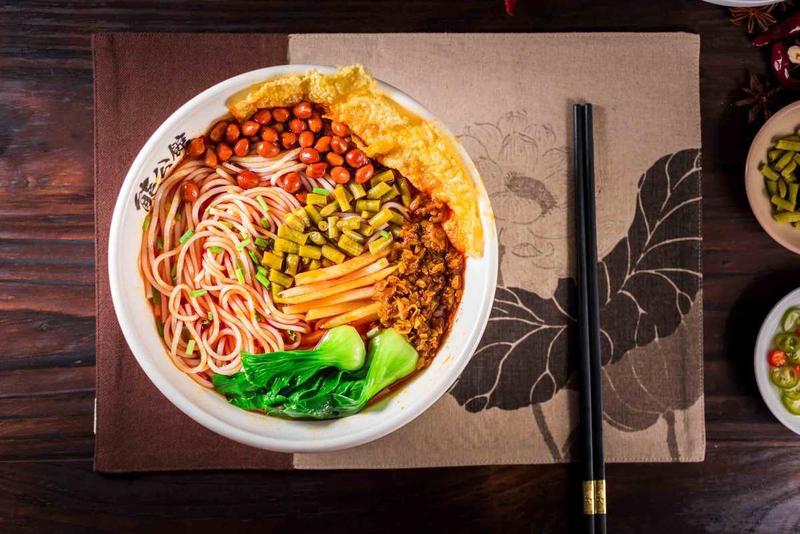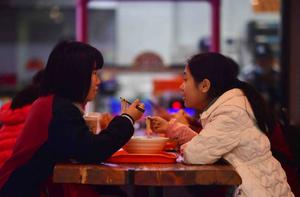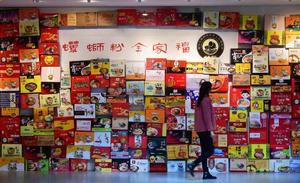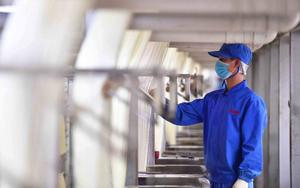Global demand rises for signature dish from Guangxi
 Luosifen is made by boiling pickled bamboo shoots, dried turnips, fresh vegetables and peanuts in a spiced river snail soup. (PHOTO PROVIDED TO CHINA DAILY)
Luosifen is made by boiling pickled bamboo shoots, dried turnips, fresh vegetables and peanuts in a spiced river snail soup. (PHOTO PROVIDED TO CHINA DAILY)
A friend of Thanh Chuc Truong's asked her if she wanted to try "something smelly", so out of curiosity, the 25-year-old Vietnamese woman agreed.
Surprisingly, Truong found luosifen, a type of Chinese rice noodles, so delicious that she asked for more.
"But as I was wolfing down the rice noodles, my friend went to the window, complained about the smell and said she was finding it hard to breathe," she said.
A student in Lanzhou, Gansu province, Truong said she fell in love immediately with the dish, and in her home country has even bought instant luosifen imported from China.
Meanwhile, Sharon Chen, 22, said she and a friend always had one or two boxes of luosifen in their dormitory when they studied at Newcastle University in the United Kingdom.
"If nobody stops me, I'll eat it all day," Chen said, adding that she often bought packaged luosifen at Chinese supermarkets in the UK or through purchasing agents, even though each bag cost the equivalent of 50 yuan to 60 yuan (US$7.25 to US$8.55), which she found a little expensive.
Chen said that since returning to China, she has yearned for luosifen, but her mother does not allow her to eat it at home due to the strong smell.
"Some of my classmates at university, especially foreigners with a keen interest in Chinese food and Asian culture, told me they liked luosifen," Chen said.
A specialty from Liuzhou, Guangxi Zhuang autonomous region, luosifen is boiled with pickled bamboo shoots, dried turnips, fresh vegetables and peanuts in a spiced river snail soup.
 Luosifen is popular at restaurants in Liuzhou, Guangxi Zhuang autonomous region. (HUANG XIAOBANG / XINHUA)
Luosifen is popular at restaurants in Liuzhou, Guangxi Zhuang autonomous region. (HUANG XIAOBANG / XINHUA)
It used to be a cheap street snack for locals in Liuzhou, but people from outside the city were not so familiar with it. However, the dish has recently been tempting the taste buds of foreigners and overseas Chinese.
From January to July, the export value of luosifen soared by more than 16 times year-on-year to reach 15.35 million yuan, according to the Liuzhou customs authorities.
Exports in July alone, valued at 7.85 million yuan, exceeded the total value from January to June. Destination countries included the United States, Canada, Australia and European nations, along with new markets such as Singapore, Russia and New Zealand.
Topics related to luosifen on Sina Weibo have triggered more than 1 billion views this year, making the dish a new "internet star". Experts said this success is impressive considering the impact the coronavirus pandemic has had on the catering sector.
The e-commerce boom, livestreaming, packaged and instant luosifen, along with more people eating it at home, are all components of this success, they said.
Jia Jiangong, deputy director of the Liuzhou commerce bureau, said exports have been helped by companies tweaking recipes to better localize the dish and enhance quality.
"In addition, with the pandemic wreaking havoc overseas, many people have been forced to stay home. Packaged rice noodles such as luosifen can meet the demand for convenient dining," he said.
Output of luosifen in Liuzhou has almost trebled since companies resumed full production. They have also had to recruit more workers and arrange night shifts to meet the increased demand, Jia added.
 A visitor is attracted by items at a luosifen museum in Liuzhou. (HUANG XIAOBANG / XINHUA)
A visitor is attracted by items at a luosifen museum in Liuzhou. (HUANG XIAOBANG / XINHUA)
Orders pour in
Yao Hanlin, founder and chairman of Guangxi Luobawang Food Co, which is based in Liuzhou, said the company's sales have boomed since Spring Festival in late January, and it is completing orders booked by agents months ago.
He said the company received so many orders from e-commerce platforms in early March that it could only complete them in May or June. As a result, many clients canceled orders, with refunds totaling more than 15 million yuan a month. "It was crazy," Yao said.
Orders continued to pour in during June and July, traditionally quiet months for the business. "This year is special," Yao added.
The company has installed more production lines to meet the growing demand. Its daily output of luosifen has risen to 280,000 bags, up from 80,000 to 100,000 last year. When its new factory at the Luowei Industrial Park in Liuzhou starts operating in late December, daily output is set to reach 1 million bags.
The company exports to some 30 countries and regions, with the US its biggest overseas market.
Exports surged to 7 million yuan from January to July, 90 percent of them going to overseas Chinese and other Asians. Yao said this was due to the increased recognition of luosifen and rising household consumption of the dish.
To attract overseas customers, the company has adjusted its recipes, introducing a tomato flavor for diners who prefer a light taste, and a mustard one. More varieties are being developed.
However, Yao said one item remains unchanged-the locally grown bamboo shoots, which are the source of luosifen's iconic stinky aroma. "We want to retain the dish's uniqueness and help customers to remember it and love it," he added.
Chen Zihao, the company's foreign trade sales manager, told Workers' Daily that it exported 350,000 bags of luosifen in the first half of this year, 29 times the quantity for the whole of last year.
It uses bilingual labeling on bags and replaces ingredients banned in certain countries with alternatives that comply with local regulations. Chen said the company's latest orders have arrived from Japan, South Korea and Italy.
Yao said the company enjoys preferential government policies, such as priority customs clearance and inspections. It has also taken part in exhibitions in Germany, New Zealand, Sri Lanka and Japan.
Its sales double annually, and this year are expected to grow by 200 percent to 300 percent, he added. In July, the company entered the Russian market for the first time, and its total exports this year are expected to reach 20 million yuan.
Liu Qingshi, chairman of Guangxi Luozhuangyuan Food Technology Co, told Xinhua News Agency in early March that his company has hired more workers, and to meet soaring demand, production has risen from 78,000 bags of luosifen a day to 120,000.
He said production continued during the Labor Day holiday in May to meet demand from domestic and overseas customers.
 A luosifen production line operates in Liuzhou. (HUANG XIAOBANG / XINHUA)
A luosifen production line operates in Liuzhou. (HUANG XIAOBANG / XINHUA)
The company's products are sold at supermarket outlets such as Walmart, RT-Mart and Century Mart. It works with more than 100 agents worldwide and its online sales channels include the e-commerce platforms Tmall, JD and Vip. From January to July, its exports rose four fold year-on-year to reach about 10 million yuan, some 6 percent of total sales.
In January 2017, the company became the first in China to export luosifen to the US, when some 50,000 bags, valued at 600,000 yuan, were shipped.
It exports to countries and regions such as Australia, Singapore, Malaysia and Thailand.
The Liuzhou commerce bureau said luosifen exporters faced a challenge last year, when many countries banned imported pork and pork-based soup due to outbreaks of African swine flu.
The authorities in Liuzhou suggested that manufacturers use beef-or chicken-bone broth instead.
For example, Liu's company developed a new product using beef bone, which maintained the original flavor. The product was "very well received", Liu said, adding that exports rose significantly as a result.
The company is also among those who have joined training courses on foreign trade, which are arranged by the local authorities.
In 2015, it worked with experts from Sichuan University in Chengdu to lower the water content of rice noodles, prolonging their shelf life. It also partnered with actors in a livestreaming promotion this year.
Listed as an intangible cultural heritage of Guangxi in 2008, luosifen featured in the acclaimed food documentary A Bite of China in 2012, marking the dish's debut on the world stage.
In 2014, the first group of workshops producing packaged luosifen sprung up in Liuzhou before the emergence of companies manufacturing the dish to meet demand from the e-commerce and livestreaming sectors.
Each month on Taobao, food video blogger Li Ziqi sells 4.5 million bags of luosifen, with turnover reaching 60 million yuan, while Li Jiaqi, a well-known livestreaming host, has sold 26,000 boxes of luosifen on the platform in less than two minutes.
In October, Guangxi Zhongliu Food Technology Co teamed up with Li Ziqi to promote sales online.
Wei Yangnian, the company's general manager, hoped to sell an average of 30,000 bags a day, but results have been way beyond his expectations, with 5 million bags once being sold in just three days. As a result, Wei doubled the number of workers at the company.
Chen Ke, senior partner at consultancy Roland Berger, said the rising influence of online celebrities such as Li Ziqi helps food with distinct Chinese characteristics and also regional culture to become known by more people at home and overseas.
Redesigned packaging and the development of e-commerce, logistics and livestreaming have also played a role, Chen said, adding that reliable quality, reasonable pricing and after-sales services are key to maintaining sustainable progress.
According to Askci Consulting Co, the total value of packaged luosifen rose from 4 billion yuan in 2018 to 6.26 billion yuan last year, and is expected to reach 10 billion yuan this year.
Jia, from the Liuzhou commerce bureau, said: "Pre-packaged luosifen marks an 'industrial revolution' in the rice noodle industry ... enabling more people to experience this authentic delicacy through express delivery."
Jiang Zhifeng, senior investment director at Meridian Capital China, said that during the pandemic packaged food has replaced dining at offline restaurants. More customers are willing to buy packaged food that maintains the original taste and quality.
Ni Diaoyang, president of the Liuzhou Luosifen Association, told China Newsweek he has full confidence in the industry's potential and believes it will remain popular for at least three to five years. "After luosifen went viral on the internet, it has been commonly seen in many homes," he added.
Yan Jingjing, marketing manager for the Liuzhou brand Haohuanluo, told the magazine that since 2014 the number of workers at the company has risen 50-fold to some 400. "We have faith in this huge market demand. Our daily production has reached 200,000 bags and we plan to increase capacity this year," Yan added.
From January to the middle of last month, more than 3,000 companies with links to the luosifen trade registered with the authorities for the first time, with 30 percent of them based in Guangxi, according to data technology service company Tianyancha.
More than 250,000 people in Liuzhou work in industries related to luosifen production, such as planting rice and bamboo, cultivating river snails, processing rice noodles, and logistics and e-commerce, according to local government data.
On Aug 18, Li Ziqi, the blogger, said a new luosifen factory to be built in Liuzhou would "not only be a local non-intangible cultural heritage but would bring hope and good livelihoods to farmers and play an important role in poverty relief and rural revitalization".
Last month, the first vocational school for the luosifen industry, which opened on May 28 in Liuzhou, began training 220 workers from Guangxi Zhongliu Food Technology Co.
Wu Yijun contributed to this story.
Contact the writers at shiruipeng@chinadaily.com.cn


